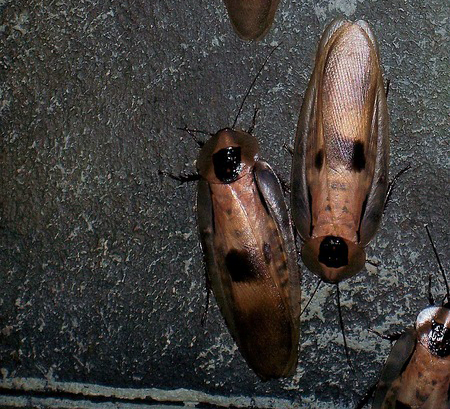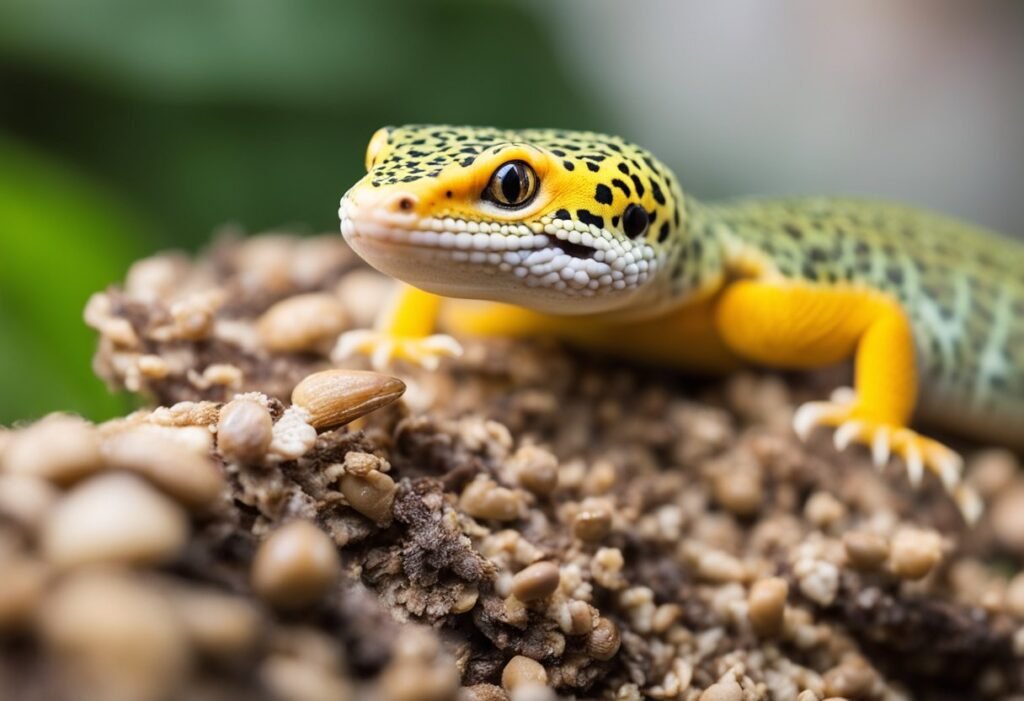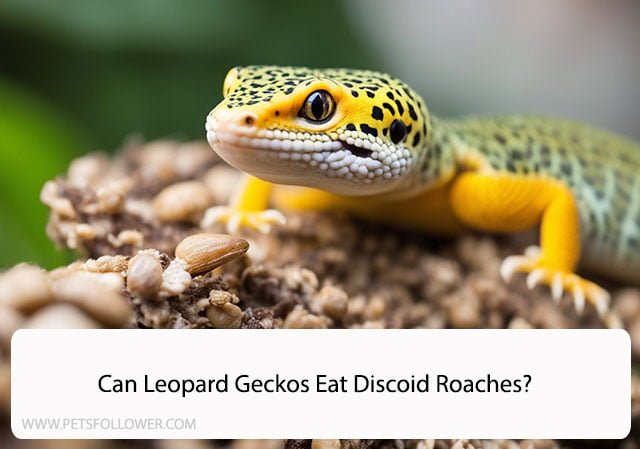Leopard geckos are one of the most popular pet reptiles due to their docile nature and ease of care. However, providing a balanced and nutritious diet for these lizards can be a challenge for some owners. Discoid roaches are becoming increasingly popular as a feeder insect for reptiles, but can leopard geckos eat them?
The answer is yes, leopard geckos can eat discoid roaches. In fact, discoid roaches are a great source of protein and other essential nutrients for leopard geckos. They are also easy to breed and maintain, making them a convenient and cost-effective feeder insect option for reptile owners. However, it is important to ensure that the roaches are properly gut-loaded and dusted with calcium and other supplements before feeding them to your leopard gecko.
Nutritional Benefits of Discoid Roaches for Leopard Geckos

As reptile owners, we are always looking for the best food options for our pets. Discoid roaches are a great option for leopard geckos due to their nutritional benefits.
Discoid roaches are high in protein, which is essential for the growth and maintenance of leopard geckos. They also contain important vitamins and minerals such as calcium, magnesium, and iron. These nutrients are crucial for maintaining healthy bones, muscles, and overall health.
Another benefit of discoid roaches is their low fat content. This makes them a great option for leopard geckos that are prone to obesity. A diet high in fat can lead to health issues such as fatty liver disease and shortened lifespan.
In addition to being nutritious, discoid roaches are also easy to digest. This is important for leopard geckos as they have a sensitive digestive system. Feeding them easily digestible food helps prevent digestive issues such as impaction.
Overall, discoid roaches are a great addition to a leopard gecko’s diet. They provide essential nutrients, are low in fat, and are easily digestible. As always, it’s important to provide a varied diet for your leopard gecko to ensure they are getting all the nutrients they need.
Feeding Guidelines for Discoid Roaches

When it comes to feeding your leopard gecko, discoid roaches can be a great addition to their diet. However, it is important to follow some guidelines to ensure your gecko is getting the proper nutrition.
Firstly, it is important to note that discoid roaches are high in protein and low in fat, making them a healthy choice for your gecko. However, they should not be the sole source of nutrition and should be supplemented with other insects such as crickets and mealworms.
When feeding discoid roaches, it is important to provide them with a nutritious diet as well. This can be achieved by feeding them a variety of fruits and vegetables, as well as a high-quality commercial roach chow.
It is also important to properly gut-load the discoid roaches before feeding them to your gecko. This means providing them with a nutritious diet at least 24 hours before feeding them to your gecko. This will ensure that your gecko is getting the proper nutrition from the roaches.
When feeding the discoid roaches to your gecko, it is important to make sure they are an appropriate size. The size of the roach should be no larger than the space between your gecko’s eyes. This will ensure that your gecko can easily digest the roach without any issues.
In conclusion, discoid roaches can be a healthy addition to your leopard gecko’s diet when fed in moderation and following the proper guidelines. By providing them with a nutritious diet and gut-loading them before feeding, your gecko can benefit from the protein-rich nutrition that discoid roaches provide.
Preparing Discoid Roaches for Feeding
Discoid roaches are a nutritious and protein-rich food source for leopard geckos. However, before feeding them to your pet, it is important to properly prepare them to ensure their health and safety. In this section, we will discuss the three main steps for preparing discoid roaches for feeding: gut-loading, dusting with supplements, and safe handling practices.
Gut-Loading Discoid Roaches
Gut-loading is the process of feeding your feeder insects with nutrient-rich foods to enhance their nutritional value for your pet. To gut-load discoid roaches, we recommend feeding them a high-quality commercial gut-loading diet or fresh fruits and vegetables such as carrots, sweet potatoes, and leafy greens. It is important to avoid feeding them foods that are high in fat or sugar, as this can negatively impact their nutritional value.
Dusting with Supplements
In addition to gut-loading, it is important to dust your discoid roaches with supplements to ensure that your leopard gecko is getting all the necessary vitamins and minerals. We recommend using a calcium supplement with vitamin D3 and a multivitamin supplement. It is important to follow the manufacturer’s instructions for dosage and frequency of dusting.
Safe Handling Practices
When handling discoid roaches, it is important to practice safe handling practices to prevent the spread of bacteria or parasites. We recommend using feeding tongs or tweezers to handle the roaches and avoiding touching them with your bare hands. It is also important to store them in a clean and dry container with proper ventilation and to remove any uneaten roaches after feeding to prevent contamination.
In conclusion, preparing discoid roaches for feeding requires proper gut-loading, dusting with supplements, and safe handling practices. By following these steps, you can ensure that your leopard gecko is getting a nutritious and safe food source.
Understanding Leopard Gecko Dietary Needs
Leopard geckos are insectivores, which means they require a diet consisting primarily of insects. In the wild, they feed on a variety of insects such as crickets, mealworms, and roaches. When kept in captivity, it’s important to provide them with a balanced diet that meets their nutritional needs.
Leopard geckos require a diet high in protein and low in fat. They also require a source of calcium and other essential vitamins and minerals. It’s important to offer a variety of insects to ensure they receive a balanced diet.
Discoid roaches are a popular choice for leopard gecko owners because they are high in protein and low in fat. They are also a good source of calcium. However, it’s important to note that discoid roaches are larger than other insects commonly fed to leopard geckos, so it’s important to ensure they are an appropriate size for your gecko.
In addition to insects, it’s important to provide your leopard gecko with fresh water and a calcium supplement. Calcium is important for their bone health and can prevent metabolic bone disease.
Overall, understanding the dietary needs of your leopard gecko is crucial for their health and well-being. By providing them with a balanced diet and proper supplementation, you can ensure they live a long and healthy life.
Potential Risks and Considerations
When considering feeding discoid roaches to leopard geckos, there are a few potential risks and considerations to keep in mind. These include choking hazards, allergic reactions, and parasite transmission.
Choking Hazards
Discoid roaches are relatively large insects, and there is a risk that they could cause choking in leopard geckos, especially if they are not properly prepared. To minimize this risk, we recommend feeding appropriately sized roaches and ensuring that they are gut-loaded and hydrated before offering them to your gecko. Additionally, it is important to supervise your gecko while they are eating and to remove any uneaten prey items promptly.
Allergic Reactions
Some leopard geckos may be allergic to discoid roaches or their exoskeletons. Signs of an allergic reaction may include swelling, redness, or itching around the mouth and face. If you notice any of these symptoms, discontinue feeding discoid roaches and consult with a veterinarian.
Parasite Transmission
Discoid roaches can carry parasites that may be harmful to leopard geckos. To minimize the risk of parasite transmission, we recommend purchasing roaches from a reputable supplier and quarantining them for at least a week before feeding them to your gecko. Additionally, it is important to maintain good hygiene practices when handling and feeding roaches, such as washing your hands and disinfecting feeding dishes and utensils.
Overall, while discoid roaches can be a nutritious and beneficial food source for leopard geckos, it is important to be aware of the potential risks and to take appropriate precautions to ensure the health and safety of your pet.
Alternatives to Discoid Roaches in Diet
While discoid roaches are a popular food choice for leopard geckos, there are other options available that can provide a balanced and nutritious diet. Here are some alternatives to discoid roaches that you can consider:
Crickets
Crickets are a common and easily available food source for leopard geckos. They are high in protein and can be gut-loaded with nutritious foods to enhance their nutritional value. However, they are also known to carry parasites and should be purchased from a reputable source.
Mealworms
Mealworms are another popular food choice for leopard geckos. They are high in protein and easy to digest. However, they are also high in fat and should be fed in moderation. Additionally, they should be gut-loaded with nutritious foods to ensure that they provide a balanced diet.
Waxworms
Waxworms are a high-fat treat that can be given to leopard geckos in moderation. They are not a suitable replacement for a regular diet, but can be used as a supplement. Waxworms are also known to be addictive to leopard geckos, so they should be fed sparingly.
Dubia Roaches
Dubia roaches are an alternative to discoid roaches that are becoming more popular. They are high in protein and low in fat, making them a nutritious food source for leopard geckos. However, they can be more difficult to find than other food sources.
Overall, there are many alternatives to discoid roaches that can provide a balanced and nutritious diet for leopard geckos. It’s important to choose a variety of food sources and to ensure that they are gut-loaded with nutritious foods to provide the best possible diet for your pet.
Monitoring Your Leopard Gecko’s Health
As responsible pet owners, we must monitor our leopard geckos’ health regularly to ensure they are healthy and happy. Here are some tips on what to look out for:
Physical Appearance
The physical appearance of your leopard gecko can tell you a lot about their health. They should have clear eyes, a clean nose, and a healthy-looking skin. Any signs of discharge or discoloration may indicate an infection or illness.
Eating Habits
Leopard geckos are known for their hearty appetite, and a sudden loss of appetite can be a warning sign that something is wrong. It’s important to monitor their eating habits and ensure they are getting a balanced diet. You can feed them a variety of insects, including discoid roaches, but make sure to dust them with calcium powder to prevent calcium deficiency.
Behavior
Leopard geckos are generally docile creatures, but sudden changes in behavior can indicate illness or stress. If you notice your gecko becoming lethargic or hiding more than usual, it may be a sign that they are not feeling well. It’s important to provide a comfortable and stress-free environment for your gecko to thrive.
In conclusion, monitoring your leopard gecko’s health is crucial for their well-being. By keeping an eye on their physical appearance, eating habits, and behavior, we can catch any potential health issues early and provide the necessary care.
Frequently Asked Questions
Are discoid roaches a safe food option for leopard geckos?
Yes, discoid roaches are safe for leopard geckos to consume. They are a nutritious and protein-rich food source that can contribute to a healthy diet for your pet.
What is the appropriate number of discoid roaches to feed a leopard gecko per meal?
The appropriate number of discoid roaches to feed a leopard gecko per meal will depend on the age and size of your gecko. As a general rule of thumb, adult leopard geckos can consume 3-5 appropriately sized discoid roaches per feeding, while juvenile geckos may only need 1-2.
Can juvenile leopard geckos consume discoid roaches without health risks?
Yes, juvenile leopard geckos can safely consume discoid roaches as long as they are appropriately sized and prepared. It is important to monitor your gecko’s feeding habits and ensure they are not experiencing any health issues or complications.
What nutritional benefits do discoid roaches offer to leopard geckos?
Discoid roaches are a nutritious food source for leopard geckos, offering high levels of protein, calcium, and other essential nutrients. They can contribute to a healthy and balanced diet for your pet.
Is there a risk of impaction when feeding leopard geckos with discoid roaches?
While there is always a risk of impaction when feeding any type of prey item to a leopard gecko, discoid roaches are generally considered a safe and low-risk food source. It is important to ensure that your gecko is consuming appropriately sized prey items and that their enclosure is properly maintained to reduce the risk of impaction.
How should discoid roaches be prepared before offering them to leopard geckos?
Discoid roaches should be gut-loaded with nutritious foods and dusted with a calcium and vitamin supplement before offering them to leopard geckos. They should also be appropriately sized to ensure that your gecko can safely consume them.





